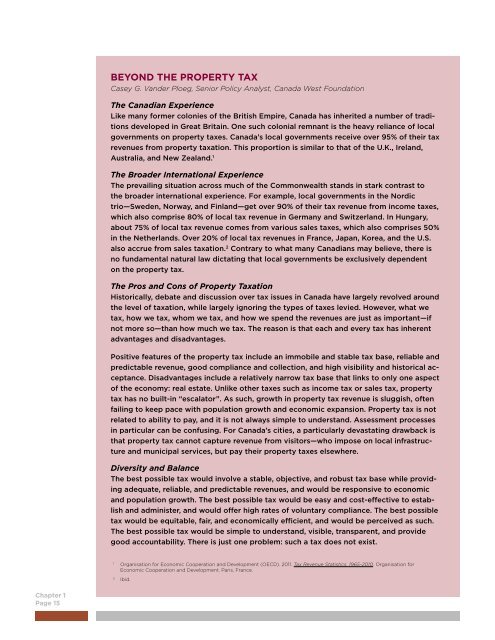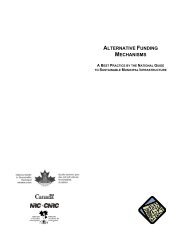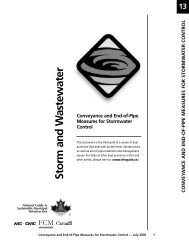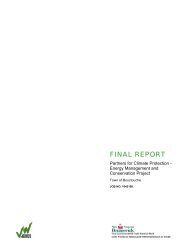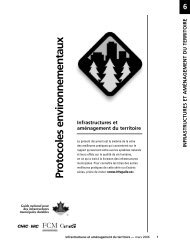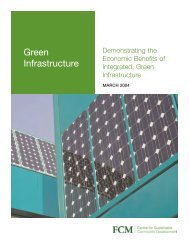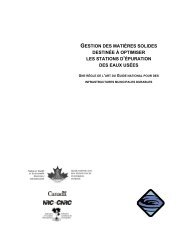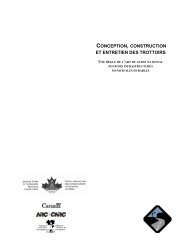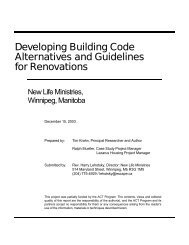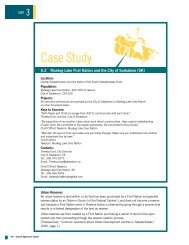The State of Canada's Cities and Communities 2012 - FCM
The State of Canada's Cities and Communities 2012 - FCM
The State of Canada's Cities and Communities 2012 - FCM
You also want an ePaper? Increase the reach of your titles
YUMPU automatically turns print PDFs into web optimized ePapers that Google loves.
Chapter 1<br />
Page 15<br />
BEYOND THE PROPERTY TAX<br />
Casey G. V<strong>and</strong>er Ploeg, Senior Policy Analyst, Canada West Foundation<br />
<strong>The</strong> Canadian Experience<br />
Like many former colonies <strong>of</strong> the British Empire, Canada has inherited a number <strong>of</strong> traditions<br />
developed in Great Britain. One such colonial remnant is the heavy reliance <strong>of</strong> local<br />
governments on property taxes. Canada’s local governments receive over 95% <strong>of</strong> their tax<br />
revenues from property taxation. This proportion is similar to that <strong>of</strong> the U.K., Irel<strong>and</strong>,<br />
Australia, <strong>and</strong> New Zeal<strong>and</strong>. 1<br />
<strong>The</strong> Broader International Experience<br />
<strong>The</strong> prevailing situation across much <strong>of</strong> the Commonwealth st<strong>and</strong>s in stark contrast to<br />
the broader international experience. For example, local governments in the Nordic<br />
trio—Sweden, Norway, <strong>and</strong> Finl<strong>and</strong>—get over 90% <strong>of</strong> their tax revenue from income taxes,<br />
which also comprise 80% <strong>of</strong> local tax revenue in Germany <strong>and</strong> Switzerl<strong>and</strong>. In Hungary,<br />
about 75% <strong>of</strong> local tax revenue comes from various sales taxes, which also comprises 50%<br />
in the Netherl<strong>and</strong>s. Over 20% <strong>of</strong> local tax revenues in France, Japan, Korea, <strong>and</strong> the U.S.<br />
also accrue from sales taxation. 2 Contrary to what many Canadians may believe, there is<br />
no fundamental natural law dictating that local governments be exclusively dependent<br />
on the property tax.<br />
<strong>The</strong> Pros <strong>and</strong> Cons <strong>of</strong> Property Taxation<br />
Historically, debate <strong>and</strong> discussion over tax issues in Canada have largely revolved around<br />
the level <strong>of</strong> taxation, while largely ignoring the types <strong>of</strong> taxes levied. However, what we<br />
tax, how we tax, whom we tax, <strong>and</strong> how we spend the revenues are just as important—if<br />
not more so—than how much we tax. <strong>The</strong> reason is that each <strong>and</strong> every tax has inherent<br />
advantages <strong>and</strong> disadvantages.<br />
Positive features <strong>of</strong> the property tax include an immobile <strong>and</strong> stable tax base, reliable <strong>and</strong><br />
predictable revenue, good compliance <strong>and</strong> collection, <strong>and</strong> high visibility <strong>and</strong> historical acceptance.<br />
Disadvantages include a relatively narrow tax base that links to only one aspect<br />
<strong>of</strong> the economy: real estate. Unlike other taxes such as income tax or sales tax, property<br />
tax has no built-in “escalator”. As such, growth in property tax revenue is sluggish, <strong>of</strong>ten<br />
failing to keep pace with population growth <strong>and</strong> economic expansion. Property tax is not<br />
related to ability to pay, <strong>and</strong> it is not always simple to underst<strong>and</strong>. Assessment processes<br />
in particular can be confusing. For Canada’s cities, a particularly devastating drawback is<br />
that property tax cannot capture revenue from visitors—who impose on local infrastructure<br />
<strong>and</strong> municipal services, but pay their property taxes elsewhere.<br />
Diversity <strong>and</strong> Balance<br />
<strong>The</strong> best possible tax would involve a stable, objective, <strong>and</strong> robust tax base while providing<br />
adequate, reliable, <strong>and</strong> predictable revenues, <strong>and</strong> would be responsive to economic<br />
<strong>and</strong> population growth. <strong>The</strong> best possible tax would be easy <strong>and</strong> cost-effective to establish<br />
<strong>and</strong> administer, <strong>and</strong> would <strong>of</strong>fer high rates <strong>of</strong> voluntary compliance. <strong>The</strong> best possible<br />
tax would be equitable, fair, <strong>and</strong> economically efficient, <strong>and</strong> would be perceived as such.<br />
<strong>The</strong> best possible tax would be simple to underst<strong>and</strong>, visible, transparent, <strong>and</strong> provide<br />
good accountability. <strong>The</strong>re is just one problem: such a tax does not exist.<br />
1 Organisation for Economic Cooperation <strong>and</strong> Development (OECD). 2011. Tax Revenue Statistics, 1965-2010. Organisation for<br />
Economic Cooperation <strong>and</strong> Development. Paris, France.<br />
2 Ibid.


